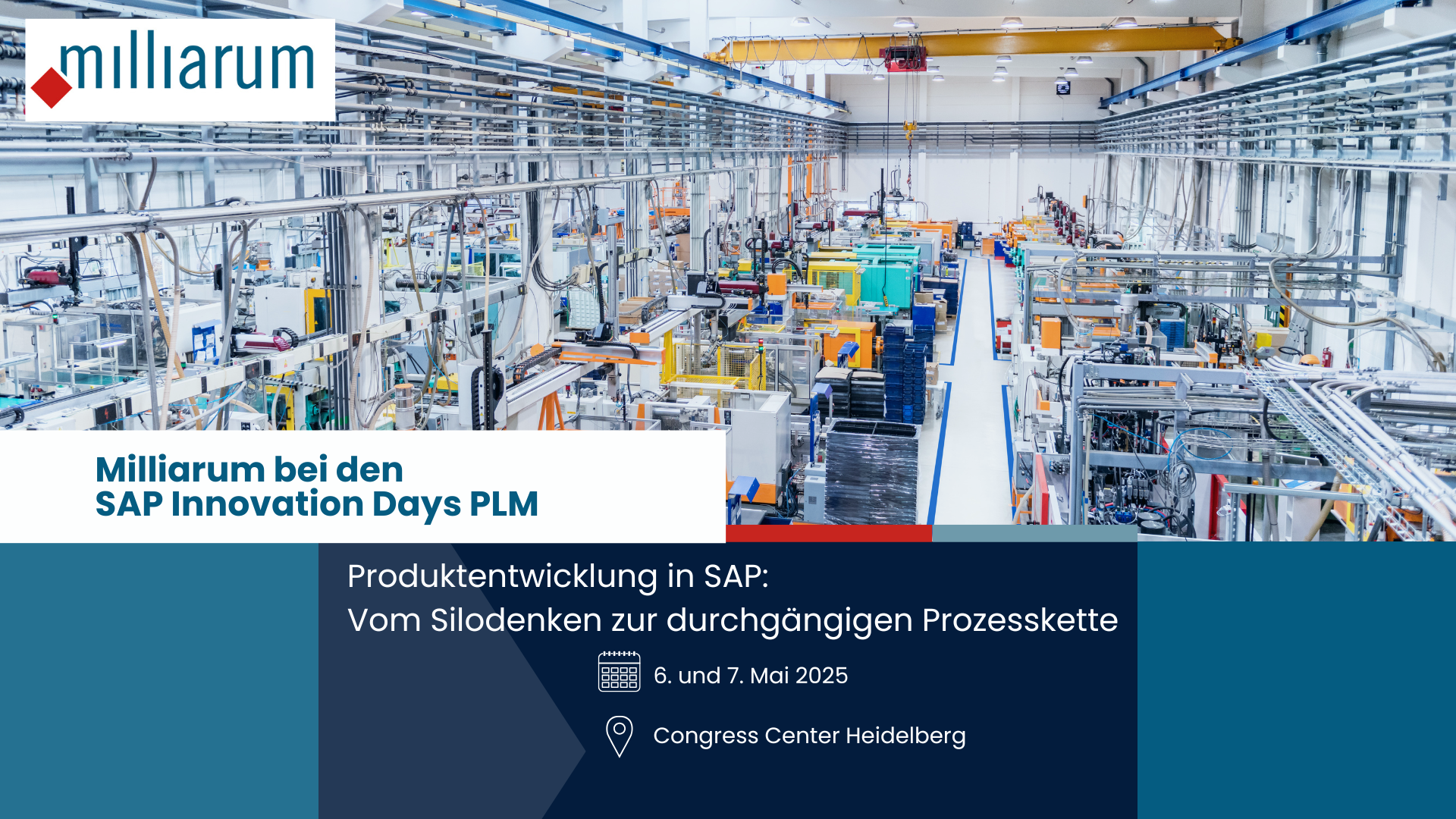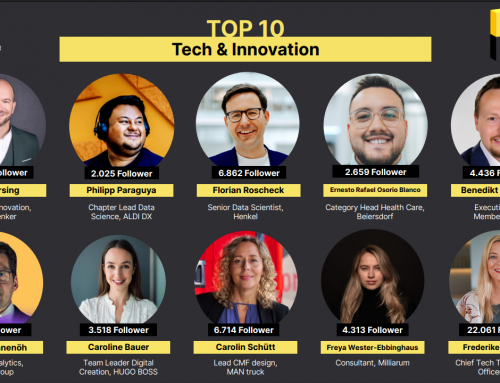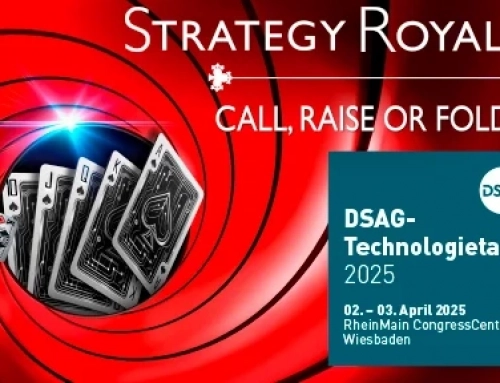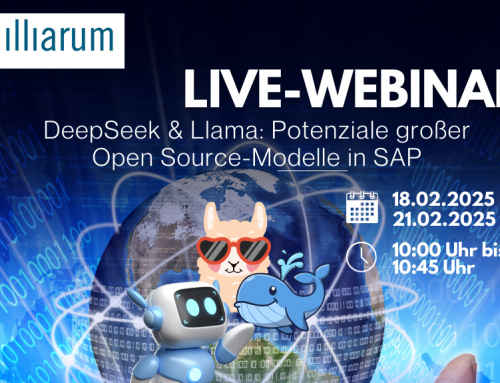Milliarum at the SAP Innovation Days PLM 2025

Product development in SAP: From silo thinking to a continuous process chain
The good cross-departmental connection of project management to the entire company makes product development efficient. At the same time, project management operates in a constant field of tension: it has to balance flexibility and structure, resolve resource conflicts and adapt to a dynamic market environment. A patchwork of isolated solutions presents project managers with obstacles when it comes to consolidating all the necessary data. How companies will master these challenges in the future in order to successfully bring products to market will be discussed at the May 6 and 7, 2025 discussed at the SAP Innovation Days PLM. Milliarum will be there!
Things don't always run smoothly in product development: constant change requests and innovative product ideas often clash with limited resources in companies. In SAP-based environments, developers work in a complex system landscape. Many companies rely on isolated solutions that map the specific requirements of individual departments like a patchwork quilt and operate in silos. The use of the generated data along the entire process chain often requires complex interfaces for development and maintenance. Well-maintained and structured data is at the heart of sustainable product development. It enables end-to-end process digitalization and paves the way for new technologies and artificial intelligence. Many companies shy away from data harmonization, as it is a complex project that puts company processes through their paces. It lays the foundation for AI-driven automation and only an overview of resources and projects provides a solid decision-making basis for efficient project planning. Various approaches can provide support for this complex project.
++projectSystem: Wiring SAP data with design solutions
In order to better connect product data, technical systems and the ERP, SAP offers ECTR, a standardized workplace where design and development data can be managed directly in SAP and linked to other company processes. Commercial data, from which key figures on the quality of development, such as lead times, the number of successful projects, the number of change requests per project phase or costs and resource consumption can be derived, are mapped in the SAP project system (SAP-PS). Milliarum has developed the ++projectSystem together with DSC Software AG in order to marry the data from the SAP-PS with the data from the ECTR. An SAP EPPM version based on SAP PPM is also available as part of a first customer shipment. The tool connects the SAP world with that of a design engineer and brings together all data and documents on the worklist in an ECTR work process. Documents from design solutions, such as CATIA and AutoCAD, or other tools, such as Word and Excel, can be linked there and all steps can be documented in the plan. Project progress, generated documents and work process sequences can be tracked by all users at all times. Redundant data storage is eliminated, approval paths are shortened and project progress can be tracked at all times.

Meet Milliarum Managing Director Steffen Wester-Ebbinghaus live at the SAP Innovation Days PLM and make an appointment with him now at the booth of our partner DSC Software AG!
Mobile: +49(0) 0172 2063248
E-Mail: steffen.wester-ebbinghaus@milliarum.de
CTO+: Standardize and automate customer order processing with configuration
By integrating PLM and EPPM, the Configure-to-Order approach (CTO+) can be extended from product configuration to process configuration. The result is more efficient customer order processing in flexible development and production networks. Configure-to-order approach (CTO+). It integrates the assumption that manufacturers should offer customer-specific, configurable products with largely standardized processes. The solution portfolio includes project configuration, project bills of materials and project scheduling. This makes it possible to automatically derive an MBOM from an EBOM on the basis of characteristics and reference locations, which takes plant and process-specific requirements into account. The solution is supplemented by capacity and resource management, which can be used to clearly display requirements from projects and available resources in the organizational structure. Bottlenecks at resource, time and knowledge level can thus be identified at an early stage and appropriate measures taken. Milliarum also integrates the Theory of Constraints (TOC) and Critical Chain Project Management (CCPM) in SAP environments. Functional enhancements integrate lean/critical chain project management, real-time capacity data, an early warning system for schedule deviations, simulation functions and informative dashboards into project and portfolio management. This simplifies complex planning and control processes in the areas of capacities, resources, materials and deadline tracking. Product customization can be optimized through standardized modules and automated processes.
Artificial intelligence: automating product development and customer order processing in SAP
In modern product development and customer order processing, access to consistent and well-maintained data is crucial in order to design processes efficiently and drive innovation. Milliarum ensures that this data is better connected within the company. This is not only a prerequisite for the use of AI in product development, but AI tools also help to gradually expand the scope for AI-supported analyses by improving data quality and increasing the degree of automation. Our AI-supported analysis tools enable companies to identify bottlenecks in product development and customer order processing at an early stage. Based on historical and real-time data, AI predicts where resource bottlenecks may occur and provides proactive recommendations for action to avoid delays. This allows companies to react more flexibly and quickly to changing requirements. Intelligent resource allocation ensures that skilled workers and materials are deployed where they are needed most urgently, ensuring that projects are completed on time. Milliarum also uses AI to run different scenarios and calculate the impact of changes or delays. By continuously monitoring and improving processes, companies can not only speed up their product development and customer order processing, but also make it significantly more cost-effective.
Balance of flexibility, structure and intelligent process integration Product development and customer order processing in SAP requires a holistic interplay of technology, data and processes. Without well-planned projects, inefficiencies arise, but too rigid an approach can slow down innovation. The balance of flexibility, structure and intelligent process integration is the key to successful development. With the ++projectSystem, the integration of the CTO+ approach and artificial intelligence in its SAP add-ons, Milliarum is helping to connect all departments and systems and bring relevant data together centrally: Data silos are broken down and a consistent, transparent database is gradually created. This networked and well-maintained data is the foundation for successful product development and enables companies to make intelligent decisions in future based on up-to-date and precise information. This enables companies to increase their competitiveness in a dynamic market environment.
At the SAP Innovation Days PLM on May 6 and 7, 2025, we will be discussing which strategies have proven themselves in practice, how approaches can be further developed and how companies can make their SAP landscape fit for the future. We look forward to the exchange!
Make an appointment now with our PLM experts Freya and Steffen Wester-Ebbinghaus!





